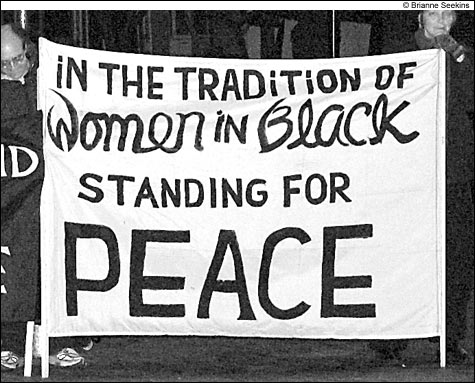
THE FEW, THE CHILLY: Congress Square protesters. |
Four weeks after Democrats rode a wave of anti-war discontent to gain control of the US House and Senate, only four protestors show up to the weekly “Bridges for Peace” demonstration on the Casco Bay Bridge. Bundled in heavy coats, knit caps, and thick gloves, they stand in a line on the South Portland side holding signs to “End the Occupation” and “Stop Funding the Oil Wars.” Cars and trucks serenade them with honks. One twenty-something beefcake leans out of his passenger window and screams “Scum!” So goes another Sunday afternoon at the vigil, which has gone on every week since the fall of 2002. But despite the four years these activists have had to hone their vision for peace, none of them agree on exactly how the country should get out of Iraq, what “immediate withdrawal” means temporally, or how to contain what we’ll leave behind. It’s never been their job to confront the devil in those details.“The only hope we have now is the Democrats will actually chair committees,” says Andy, a 49-year-old activist from South Portland who declines to give his last name because he works for the government. He’s wearing a navy blue visor and “Impeach Bush” and “Kucinich Means Courage” buttons. The freezing noontime air has turned his nose pink. “What they do with that, who knows? My hope is that they’ll come out with a clear message. You’ve got a lot of big, intelligent people — former generals, former CIA people, folks that are clearly much more informed as to what’s needed, more than people like me.”
A station wagon honks as it passes him.
“I don’t have a clue what’s needed.”
Everybody’s talking about
But the time has come for activists like Andy to find a clue. November 7, election day, couldn’t have been more important for any other anti-Bushie group than the anti-war movement, which earned a nationwide pat on the back when American voters turned en masse to Democrats who had successfully linked the Bush administration with the bloody nightmare that is the war in Iraq. Democrats gained 31 seats to snag the majority in the US House of Representatives and six seats for control over the US Senate. It is the first time since 1994 that the Dems have had control of both branches of Congress. The dissing of the Republicans reveals, as Boston Globe columnist Scott Lehigh wrote on November 8, that “the country has concluded [Bush] made a huge mistake in going to war.” (It also led to the resignation of defense secretary Donald Rumsfeld the day after the election. Rumsfeld’s replacement, Robert Gates, was confirmed by the Senate on December 6; so far, he seems like less of a war hawk than Rumsfeld.)
But everything sweet comes at a price. The anti-war movement must now sharpen its goals to a point if it plans to play any significant role in what happens to American soldiers in Iraq. As Congress takes its holiday break, what to do with Iraq is the topic of every major news debate on television, some politician’s new withdrawal plan is on the front page of national newspapers almost every day, and the president has finally admitted publicly that we are losing the war.
So why, now that the lines of dialogue have split wide open, is the anti-war movement virtually invisible? Unless you’re an activist, or related to one, you might not know that the out-of-Iraq faction in America has millions of members, dozens of affiliated organizations, and organizers who, at least according to them, talk frequently with leaders of Congress.
While the grassroots activists — the civil disobedience protest core — prepare for a massive demonstration in Washington DC in January when Congress reconvenes, the leaders of the movement whose job it is to take that “out-now” momentum and turn it into policy are waiting for consensus from the movement’s characteristically independent members to figure out which specific plan to fight for — should it be Representative Jack Murtha’s proposal to withdraw all troops by the end of 2007 or the call from Senators Jack Reed and Carl Levin to withdraw within the next few months? Should the country take Senator Joseph Biden’s suggestion that Iraq be divided into three semiautonomous zones? Or will it be another plan as-yet-unveiled?
Revolution, evolution, masturbation
Though polls conducted earlier this month by the Los Angeles Times, ABC News, the Washington Post, CBS News, and Newsweek show that between 62 percent and 75 percent of Americans disapprove of the way Bush is handling the war in Iraq, and more than half of those polled want a decrease in troops or a fixed timetable for withdrawal, rapid withdrawal is only one of several plans being debated now in DC, and it’s lately been relegated to the background by the president’s announcement that he intends to increase the size of the military. Democratic leaders who won by piggy-backing on the movement’s platform have not uniformly called for withdrawal, and some of them support expanding the military. The peace movement appears to already have revealed its inability to influence Congress.